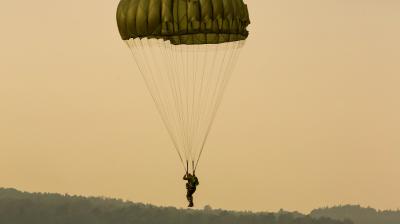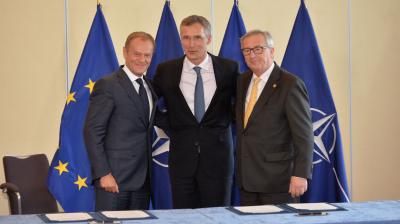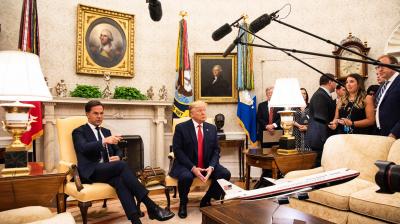This year marks the 70th anniversary of NATO, which its 29 members will commemorate on 3 and 4 December in London. To be clear: this will not be a regular NATO ‘Summit’. The gathering has a less formal status and will not be concluded with a common statement on how to move forward. Rumour has it that changing the name to a NATO’s ‘Leaders Meeting’ was inspired by President Trump’s capricious behaviour during past summits. This development is indicative of a larger problem: disunity within the Alliance. NATO is the most important security organisation of our time, but is it aware of its most pressing threat?
"This development is indicative of a larger problem: disunity within the Alliance."
NATO Secretary General Stoltenberg already stated in April that the meeting in London would provide the opportunity for leaders to address current and future security challenges and to ensure that the Alliance continues to adapt to keep its population safe. Yes, the 70th anniversary does come at a critical time for NATO, as tensions with Russia are high and worries are growing about threats from China. However, while the Alliance has to face the changing security environment threatening it from the outside, NATO must also confront its internal problems.
The past few years have been dominated by concerns about the potential fallout from the Trump administration. To what extent is the US President committed to the Alliance? Before taking office he called NATO “obsolete” and since then he has been publicly calling on NATO members to pay more for their defence and thus depend less on American money. Although one can argue that the US President’s words motivate his European partners to take their commitments to defence more seriously, they projected the image of an unstable partnership to the outside.
Moreover, at the beginning of this year, Germany published its defence budget, which revealed an even less ambitious spending goal than before. The figures show that the 1.5% of GDP that Berlin originally aimed to spend on defence by 2024 – which already falls short of the 2% NATO target – will now not even be met. The reason is that the Social Democrats, sharing government responsibility with Chancellor Merkel’s Christian Democrats, are unwilling to sign up for a much higher defence bill. The defence spending target seemed to embody NATO’s place on Germany’s priority list. However, even if Germany is only spending 1.2% of its GDP on defence, this still equates to high numbers since it is the biggest European ally in terms of population and GDP. Also, the German defence budget has gradually risen in the last couple of years, nearing its peak of €47 billion in 2019 – an increase of 10 percent compared to 2018. More significantly, according to a proposed NATO plan, Berlin’s contribution to the Alliance’s common military and civil budgets would be raised from 14.8% to 16%, while the US input is reduced from 22% to 16%.
"A more recent and critical development jeopardising NATO unity is the Turkish invasion of Syria."
A more recent and critical development jeopardising NATO unity is the Turkish invasion of Syria. The relations between Turkey and other NATO member states have become increasingly strained in the past year, partly by Turkey’s procurement of the Russian S-400 missile defence system. The S-400 Russian batteries are not only incompatible with the NATO defence systems, but could also endanger the security of the F-35 fighter jets which Turkey recently purchased from the US. In response, the US has halted deliveries and shut Turkish companies out of components manufacturing. Turkey is now in advanced negotiations with Russia to order Su-35s, the Russian-made fighter aircraft. Another sign that the US-Turkey relationship is deteriorating on multiple fronts is the fact that the US used the al-Asad Air Base in Anbar province, Iraq, for the Baghdadi raid. One would, however, expect the NATO base in Incirlik, Turkey, to be the first choice. Perhaps these days the US considers Iraq as a more reliable ally than its NATO partner Turkey? Some European politicians as well as former American military leaders have reacted to Turkey’s invasion of Syria by calling for the country to be suspended or even expelled from the Alliance. Although the latter is formally impossible, it underlines the fragility of Turkey-NATO relations. Several European countries, including Germany, France and the Netherlands, have decided to halt arms exports to their NATO ally. The EU, too, has condemned the invasion.
"Perhaps these days the US considers Iraq as a more reliable ally than its NATO partner Turkey?"
Disagreements in an organisation that consists of 29 different countries, with varying interests and cultural backgrounds, can be expected from time to time. One should be careful not to blow each quarrel out of proportion. Nonetheless, what is also expected from the Alliance – and what is crucial for its credibility – is that all member states share the same international security interests. The Leaders Meeting in December provides an opportunity for NATO to get its priorities aligned, although this will be hard with Trump at the table. The other member states must act in the best interests of NATO and avoid following separate routes as a form of protest against the current White House incumbent. However, irrespective of the future US course, the European NATO pillar should also take a proactive stance. In line with the rising European defence budgets and the increasing number of European defence initiatives (such as PESCO, the European Defence Fund or the European Intervention Initiative), European countries could seize the initiative and demonstrate the value of their combined military capabilities.
This essentially means that the Allies have a choice to make as to what kind of relationship they wish to establish with each other – in and out of the public eye. In the case of Turkey, the NATO defence ministers already stated after their last gathering in Brussels that there is little they can do to restrain Turkey. There is a delicate interdependence between Ankara and the rest of the Alliance which provides the basis of the partnership: NATO’s deterrence for Turkey’s strategic location. However, at its core stands the US-Turkey relationship. If, besides the NATO security guarantee, Turkey wants to continue benefiting from the presence of American troops, materiel and intelligence at the Incirlik base on top of US foreign investment in its economy, a new bilateral arrangement is needed. For starters, Ankara must stop buying Russian military materiel and reverse the purchase of the Russian S-400 batteries. In exchange, the US could welcome Turkey back to the American market. Right now, though, they are still miles apart, rendering the scenario unlikely.
"Irrespective of the future US course, the European NATO pillar should also take a proactive stance."
Finally, if Trump’s opportunistic behaviour continues – and there is no reason to believe otherwise – the relationship not only with Turkey but with NATO as a whole might be in grave danger. Warning his Allies in public and calling NATO names is only the tip of the iceberg. The recent White House decision that prevented Russia from being condemned by the State Department for seizing Ukrainian ships is just another example of US foreign policy contradicting NATO policy. If the Allies intend to prevent the Kremlin from getting a foot in the door (again), disunity could be put on the agenda of the Leaders Meeting as the main issue to be tackled. NATO can only credibly address current and future security challenges if it get its internal affairs in order in the meantime and unites over its shared interests.
Follow @KTKruijver and @Clingendaelorg on Twitter.







